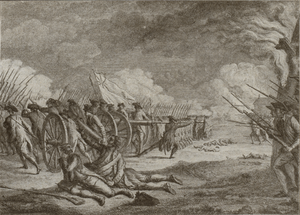Battle of Lexington
| Battles of Lexington and Concord | |||||||
|---|---|---|---|---|---|---|---|
| Part of the American Revolutionary War | |||||||
 Romanticized 19th-century depiction of Battle of Lexington |
|||||||
|
|||||||
| Belligerents | |||||||
|
|
|
||||||
| Commanders and leaders | |||||||
|
|
|
||||||
| Strength | |||||||
|
Lexington: 77 Concord: 400 End of Battle: 3,960 |
Departing Boston: 700 Lexington: 400 Concord: 100 End of Battle: 1,500 |
||||||
| Casualties and losses | |||||||
| 49 killed 39 wounded 5 missing |
73 killed 174 wounded 53 missing |
||||||
Strategic American victory
The Battles of Lexington and Concord were the first military engagements of the American Revolutionary War. The battles were fought on April 19, 1775, in Middlesex County, Province of Massachusetts Bay, within the towns of Lexington, Concord, Lincoln, Menotomy (present-day Arlington), and Cambridge, near Boston. The battles marked the outbreak of open armed conflict between the Kingdom of Great Britain and thirteen of its colonies on the mainland of British America.
In late 1774 the Suffolk Resolves were adopted to resist the enforcement of the alterations made to the Massachusetts colonial government by the British parliament following the Boston Tea Party. The colonial assembly responded by forming a Patriot provisional government known as the Massachusetts Provincial Congress and calling for local militias to train for possible hostilities. The rebel government exercised effective control of the colony outside of British-controlled Boston. In response, the British government in February 1775 declared Massachusetts to be in a state of rebellion.
About 700 British Army regulars in Boston, under Lieutenant Colonel Francis Smith, were given secret orders to capture and destroy rebel military supplies reportedly stored by the Massachusetts militia at Concord. Through effective intelligence gathering, Patriot colonials had received word weeks before the expedition that their supplies might be at risk and had moved most of them to other locations. They also received details about British plans on the night before the battle and were able to rapidly notify the area militias of the British expedition.
...
Wikipedia
